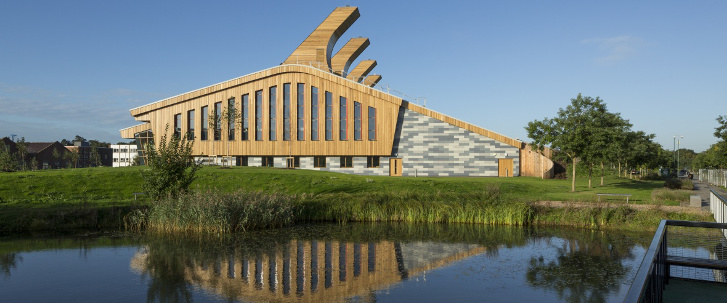
What the strategy means to me - sustainability
Director of Development and Sustainability Andy Nolan writes about the aim for carbon-neutrality by 2028.
The University has earned an excellent reputation for its commitment to sustainability over the years. However, this commitment has never been as forthright as it is in the new University Strategy, nor has the bar ever been set so high.
A zero carbon city
The Strategy places a particular emphasis on environmental sustainability, supporting the City of Nottingham’s desire to be a net zero carbon city by 2028 and working with partners in China and Malaysia to improve sustainability within their regions. This is without doubt a challenging ambition but one we must deliver on.
It does this with the confidence of knowing that our students and staff really want this to happen. Sustainability was one of the leading themes in the consultation exercises that informed the Strategy. It is clear that our University community wants all of us to be ambitious in tackling our greatest global challenge.
This commitment to carbon neutrality builds on our current contribution to research, investment decisions, collaborations and our behaviours on campus.
Our global research programme is supporting a more sustainable planet in developing, for example, renewable sources of energy, green propulsion systems, climate-resistant crops and a sustainable food supply. Significant carbon reduction research is conducted at our Ningbo campus and our Malaysia campus provides a world-leading field laboratory for research into environmental protection.
Our financial investments reflect our research programmes in supporting ever-greater sustainability, we have fully divested from investments in fossil fuels, and keep our investment portfolio under review to ensure it complies with ethical investment policy.
On campus, the WasteNott campaign launched last September has reduced the use of disposable drink cups by two-thirds and almost 1 in 5 plastic bottles in our University operations. We have cut more than 24,000 tonnes of carbon dioxide emissions from electricity and gas that we consume and less than 1% of our campus waste now goes to landfill.
Meeting our commitment
Of course, we will need to scale up our efforts, and rapidly, if we are going to get anywhere near to achieving carbon neutrality in eight short years. To ensure the delivery of our sustainability objectives I am delighted that Professor John Atherton, Pro-Vice-Chancellor for the Faculty of Health and Medical Science, will chair a new Sustainability UEB sub-Committee. Consisting of academic and professional service experts in sustainability, it will bring leadership and champion the changes we will need to make a real difference.
And we will all have to work to make that difference - individually and collectively. As Director of Development and Sustainability, I am leading a development framework that will embed our sustainability ambitions into our University estate plans so that we can evolve without a leaving carbon footprint. This will mean developing our campus to use less energy; integrating more renewable energy technologies such as solar, ground source and biofuels; using the space we occupy more efficiently and repurposing our existing buildings; reducing the need to travel between campuses; and supporting healthy, clean, efficient modes of travel when we do.
Our Estates team will ensure our buildings achieve ever-higher efficiency standards, integrating renewable energy systems as a minimum standard so that buildings like the Carbon Neutral Laboratory are the norm,not the exception.
The Estates team will also need to make our campuses more resilient to the extreme weather patterns we have experienced in recent years, placing additional emphasis on the biodiversity of our campuses and ensuring it can meet the more extreme conditions we may face now and in the future.
Our individual contribution
Of course, this is not simply ‘an estates issue.’ All of us can and must take personal responsibility for sustainability on campus as much as at home. We need everyone to step up, consume less and reduce the unnecessary waste of valuable carbon atoms – whether they are in the things we buy, the fuel we consume, the travel choices we make and the diet we eat.
Ask yourself where you can reduce the amount of energy consumed in offices, laboratories, seminar rooms and social spaces. We will use the Getting in Shape programme to look at building opening times, lighting and heating patterns, and automated power-downs to help this.
Ask yourself when travel is truly necessary or where you could achieve your aims in a different way. Getting in Shape will also look to reduce the energy, emissions and expenditure we incur when travelling, particularly by air.
Ask yourself if your diet can support a more sustainable planet. Our incoming Catering, Hospitality and Conferencing Director will look at how campus catering can support lower carbon diets which are better for the planet as well as ourselves.
We are not alone in this naturally, all Russell Group universities are committed to this agenda and are working together with the newly launched Climate Commission led by the Environmental Association for Universities and Colleges and Universities UK.
So what does the University Strategy mean to me? It means we can be bold in doing the right thing for the long term good of our University, its students and staff. It means in doing so we can make a real contribution to the city, the country and the planet’s carbon reduction targets. It means that our University will meet the enormous challenge of global warming head on in everything we do – our teaching, our research and how we run our University.